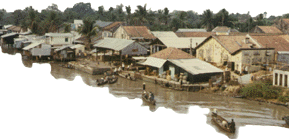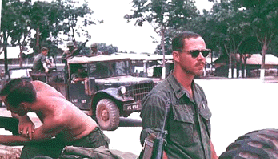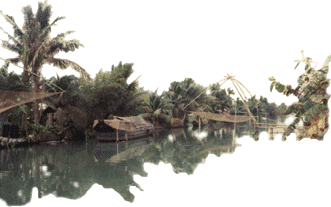Some of the guys used to joke about how it was safer in Vietnam than on
the sidewalks of New York City. That was supposed to be especially true in the rear,
at the big bases like Cu Chi. I'm here to say it wasn't necessarily so. There
were times when Cu Chi was every bit as dangerous as the Ho Bo Woods.
 No one was truly safe in a place where people were working so
hard at killing one another. Even the non-combatants felt the pressure. And
the weapons to commit serious injury were always close at hand. We heard from time
to time how a GI, tired of the discipline, boredom, and nit-picking daily drills and
details, would throw a tear gas grenade (or in extreme cases a fragmentation grenade)
under the hootch of a senior sergeant or company officer. It happened in our own
company area at Cu Chi one night - someone had a grudge to settle with the sergeant-major.
No one was truly safe in a place where people were working so
hard at killing one another. Even the non-combatants felt the pressure. And
the weapons to commit serious injury were always close at hand. We heard from time
to time how a GI, tired of the discipline, boredom, and nit-picking daily drills and
details, would throw a tear gas grenade (or in extreme cases a fragmentation grenade)
under the hootch of a senior sergeant or company officer. It happened in our own
company area at Cu Chi one night - someone had a grudge to settle with the sergeant-major.
Yes, when I say Cu Chi could be hazardous, I speak from experience. I came as
close to getting killed right in my own company area as I ever did out in the field.
It happened late one evening as I was walking back to my hootch after a movie at
the base theater. The night was pitch black and there were no street lights.
The road through the company area had a high crown, built to let the monsoon rains wash
off the top into the four-foot trenches on either side. Beside me on the right was a
line of storage buildings and a junior officers hootch. It was filled with
lieutenants enjoying a card game. I could hear their laughter and talk through the
open screen walls, along with the occasional clink of a bottle.
As I came directly behind the building, walking quietly on the hard road surface, I
heard a small, heavy metallic object hit the road just ahead of me. I immediately
recognized the sound as a fragmentation grenade. Someone
had thrown it behind the hootch to scare the officers, but now it had my name on it.
In an instant I reacted, just as I would have a month or two earlier in the field.
I threw myself to one side, aiming for the deep ditch at the side of the road.
The grenade exploded just as I slammed into the hard dirt. It had bounced a
couple of times and detonated just over the crest of the road, on the side opposite me.
I was lucky. In another second or two I'd have taken the full force of the
blast from just a few yards away.
I raised my head, and heard the sound of footsteps running off up the next street, and
then a door closing. I was a bit shaken as I got up and dusted myself off. The
next day I went back for a look. On the bank of the road, just over my head as I had
hit the ground, was a sheet metal latrine. The sides looked as if someone had used
them for target practice with a 410 shotgun.
Even the "safe" things could sometimes be dangerous. Having been out in
the field for seven months, I was always a bit on the jumpy side. You can imagine my
reaction when, one evening as I sat reading in my hootch, I suddenly heard what sounded to
me like grenades exploding nearby. The explosions came quickly, one after another,
and were close enough to get concerned about. The explosions were definitely inside Cu
Chi's defense perimeter, and close to our company area.
 While an enemy attack on a big base like Cu Chi was
rare, it did sometimes happen. Before I came to Cu Chi, the Viet Cong had staged a
ground attack. The attacking forces penetrated as far as our company area.
There they had fought a pitched battle, right where I was now living.
While an enemy attack on a big base like Cu Chi was
rare, it did sometimes happen. Before I came to Cu Chi, the Viet Cong had staged a
ground attack. The attacking forces penetrated as far as our company area.
There they had fought a pitched battle, right where I was now living.
And it seemed to be happening again. I dropped to the floor and reached for my 40 mm grenade launcher. I slid a round into the big open
barrel and snapped the breech shut. Staying low, I moved to the doorway and peered
around the sandbag wall protecting the building. To one side, about three hundred
yards away, the sky glowed with red and yellow hues. As I watched, more muffled
explosions sounded. Then a burst of flame lit the entire area, and at last I could
see what was happening.
The pool area across the road was on fire. There were always dozens of drums of
Chlorine stacked behind the far wall of the pool, and the monsoon rains must have leaked
into some of them, heating them up. Now, the smoldering chemicals had burst into
flame, and the canisters were actually exploding! I felt a bit foolish as I
hurriedly returned the gun to its rack and ran to a phone to call for help.
Getting transferred to the rear was no guarantee we would always stay in the rear
either. No sooner had I made the transition to desk jockey than I was
"volunteered" to pull night bunker duty at places like Patton II. When our
line companies guarding them got called out on ambush patrol, we were recruited to stand
guard in their place. About four o'clock in the afternoon they'd round up a couple
truckloads of us clerks and send us off. Of course, it was ninety-five percent
hazard free - but that still left the other five percent.
You'll remember that when we first built Patton II we set it up on the downhill side of
the dirt road, probably because there were still families living on the other side of the
road on slightly higher ground. The entire base was built on a bit of a slant.
From the thick brush of the river bank, several hundred yards downhill to the
southeast, you could see right over the eight foot berm into the center of the base.
One night we were called to defend the ramparts. We were just settling in as the
sun dropped over the horizon. All of a sudden a sharp explosion sounded from the
center of the base, right behind the command buildings. We turned to see dirt and
debris flying in all directions as a rocket-propelled grenade, fired from the river bank,
blew a big hole in the latrine next to the HQ building. And by sheer chance, one of
us "Cu Chi commandos" was inside at the time. He took a load of shrapnel
in the stomach and groin, and was still screaming when the Medevac flew him away.
 Sometimes life in the rear was just too dull. That's when the call of
adventure won out over the risk of danger, and I volunteered for night helicopter
missions. Division sent reconnaissance choppers up each night, and of course they
opened fire if they found anything. My job was to man the big starlight scope they
carried, and direct the fire if we spotted anything. Most nights we saw
nothing. But when we did, the mini-gun mounted in the passenger bay opened fire, and
thousands of rounds of 7.65 mm ammo spewed into the night. Every fifth round was a
tracer. In the dark it looked as if a solid stream of fire was descending to the
earth. When the stream reached the ground it broke into hundreds of droplets racing
off in every direction. The noise was deafening.
Sometimes life in the rear was just too dull. That's when the call of
adventure won out over the risk of danger, and I volunteered for night helicopter
missions. Division sent reconnaissance choppers up each night, and of course they
opened fire if they found anything. My job was to man the big starlight scope they
carried, and direct the fire if we spotted anything. Most nights we saw
nothing. But when we did, the mini-gun mounted in the passenger bay opened fire, and
thousands of rounds of 7.65 mm ammo spewed into the night. Every fifth round was a
tracer. In the dark it looked as if a solid stream of fire was descending to the
earth. When the stream reached the ground it broke into hundreds of droplets racing
off in every direction. The noise was deafening.
On a "sniffing" run one evening we registered a strong reading in the dense
jungle below. The sniffer was a device constructed to detect unusual traces of
ammonia in the air, the byproduct of urine, and the sign of an enemy camp. We
circled back to double-check. As we flew past at treetop level, we got solid
confirmation of the reading - green tracer rounds rose out of the jungle right at us.
The heavy thunk of bullets piercing the Huey's metal skin warned us to get out of
there fast!
One fringe benefit of volunteering for those flights was getting to see the big
situation board, loaded with all of the intelligence information gathered for the region.
Looking at the big picture I could understood a little better the grand design of
the things we had done in the field. Each of those long daily hikes had been
directed toward some known enemy hideaway. And the Eagle flights had been sent to
interrupt enemy movements heading from the Cambodian border straight toward Saigon.
From time to time I was also drafted as a jeep driver. It helped break the
monotony of typing reports, and it meant a day of driving through the picturesque
countryside, out where people thronged the streets, and where our line companies were
still engaged in a daily struggle with the enemy. I drove as far northwest as Tay
Ninh with its ornate Cao Dai temple, and to the Duc Hue Headquarters at the
old Sugar Mill along the Oriental river where gunboats patrolled
the wide sweep of water. 
The real excitement of driving to the field was the race to get back before they shut
the big gates at Cu Chi for the night. It was said that after seven o'clock at night
they didn't open the doors for anyone. The thought of waiting alone outside the wire
all night did not appeal to me.
One night we came in just under the wire. We were late starting back. The
captain urged me on as I pushed the pedal to the floor, slowing only for the occasional
villages we came to. Each time we neared a village we encountered crowds of people
thronging the blacktop. Slowing only slightly, I honked them aside. As the
hour approached, I went faster and faster. The open stretches were deserted.
We came to a secured village where the ARVN fort had shut its barbed wire entrance gates,
slowing us even more. At their own leisurely pace the soldiers swung open the gates,
and I raced through to the open highway beyond.
The ride became a blur of faded green trees and brown huts, a kaleidoscope of colors as
blue and pink and green and white-clothed bodies swept past. I kept one hand on the
horn, warning people to leave us a path down the middle.
Finally we passed the last village before Cu Chi, and the empty road stretched clear
ahead of us. As fast as the jeep would go (there is a governor on the carburetor) we
sped along. The warm evening air was beginning to cool slightly. As Cu Chi came into
sight, I honked my horn and flashed my lights to signal them we were coming in. The
road was deserted, even though my watch gave us five more minutes. Then I was close
enough to see - the gates were shut!
I slowed down, my heart sinking, wondering how we were going to get inside. As I
pulled up to the gates, I saw they were not yet locked. A GI stepped out, M-16 in hand, gave us the once-over and pulled one door open.
With a sigh of relief I thanked him, and the captain and I drove inside to the security of
the big Division base.
